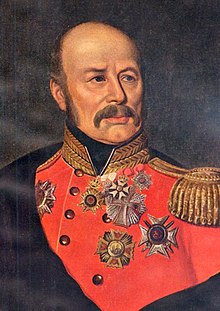Peter von Scholten
| Peter von Scholten | |
|---|---|
 |
|
| Governor of St. Thomas, St. John | |
|
In office 1818 – June 1820 |
|
| Monarch | Frederick VI |
| Preceded by | Christian Ludvig von Holten |
| Succeeded by | Carl Gottlieb Fleischer |
| Governor-General of the Danish West Indies | |
|
In office 1827–1848 |
|
| Monarch | Frederick VI (until December 1839), Christian VIII |
| Preceded by | Christian Ludvig von Holten |
| Succeeded by | Frederik von Oxholm |
| Personal details | |
| Born |
Peter Carl Frederik von Scholten 17 May 1784 Vestervig, Denmark |
| Died | 26 January 1854 (aged 69) Altona, Germany |
| Spouse(s) | Anne Elisabeth Thortsen (m. 1810) |
| Parents |
Casimir Wilhelm von Scholten Catharina Elisabeth de Moldrup |
Peter Carl Frederik von Scholten (17 May 1784 – January 26, 1854) was Governor-General of the Danish West Indies from 1827 to 1848. He was born in Vestervig, Thy, Denmark as the son of captain Casimir Wilhelm von Scholten and Catharina Elisabeth de Moldrup.
As a young man, he joined the Danish army and in 1803 he was appointed ensign in the West Indies unit. He was transported to Great Britain when this country occupied the Danish West Indies, likely in 1807. Peter von Scholten married the daughter of captain of the Danish army Johan Thortsen, Anne Elisabeth Thortsen, on October 31, 1810.
Later, he had a career as an officer in Copenhagen, first as second lieutenant for Sjællandske Jægerkorps in 1808, then as premier lieutenant in 1811, and finally as staff captain in 1813. This led to becoming adjutant for Frederick VI of Denmark's general adjudant Frants Cristopher Bülow. He served there until 1814 as British occupation of the Danish West Indies ended, and he got his first official position on St. Thomas, as customs toller.
Meanwhile, von Scholten continued advancing in the Danish military, becoming major in 1816, lieutenant colonel in 1820, commander of Dannebrog in 1828, and major general in 1829.
In 1827, he became acting governor general of St. Thomas. From 1835 to 1848, he became governor general for all three islands, Saint Thomas, Saint Croix, and Saint John, giving him virtually absolute command of the islands. In this period he showed himself a patriarchal ruler trying to lighten the burden of the slaves and to cushion the racial tensions. He did this by creating schools for them, as well as permitting them private ownership.
...
Wikipedia
